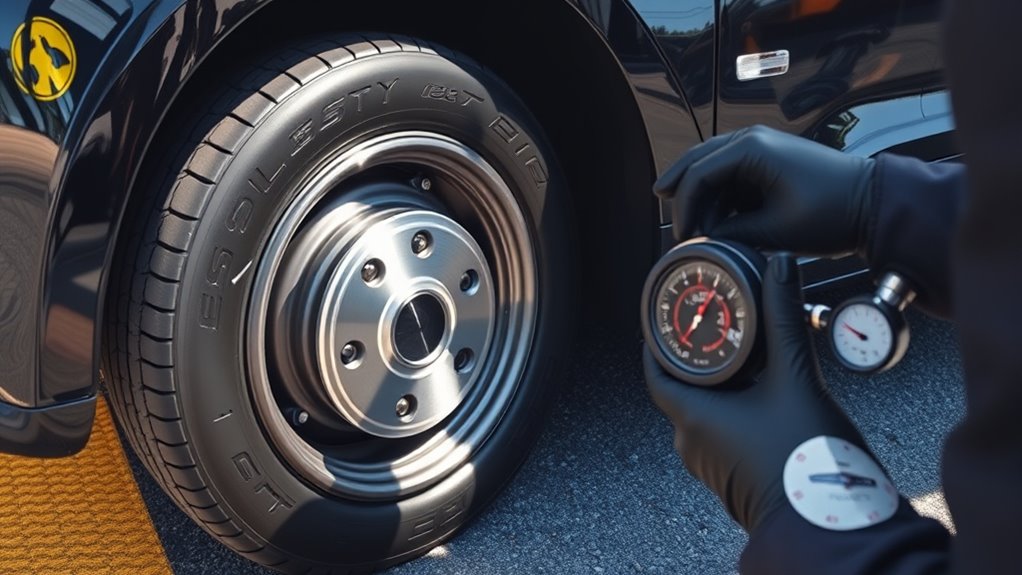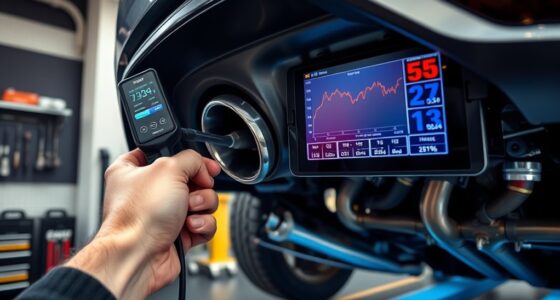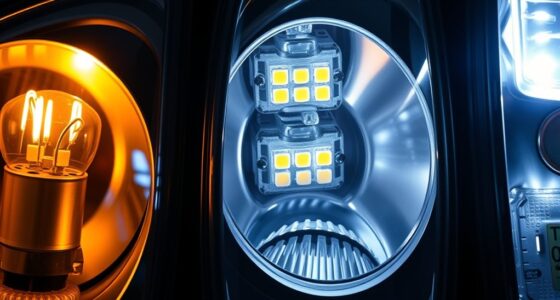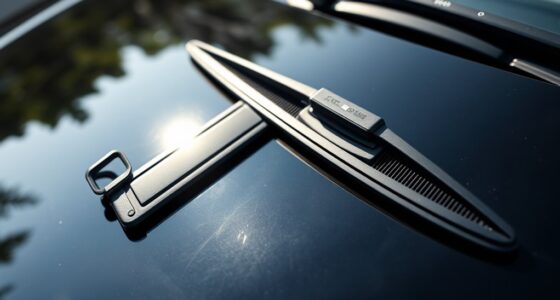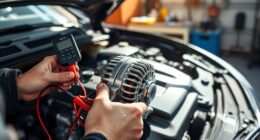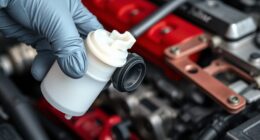Maintaining your EV’s brakes and tires is a bit different because regenerative braking reduces wear on your brake pads but doesn’t eliminate the need for regular inspections and checks. Proper tire pressure is vital for safety, range, and tire life, especially since EVs are heavier. You should regularly monitor tire pressure and have brake systems checked by professionals to guarantee everything works smoothly. Keep going to discover more helpful tips for keeping your EV in top shape.
Key Takeaways
- EVs use regenerative braking to recharge batteries, reducing wear on mechanical brake components.
- Regular brake inspections remain essential to ensure safety despite regenerative braking assistance.
- Proper tire pressure is crucial for EV efficiency, handling, and maximizing battery range.
- Tire pressure monitoring systems (TPMS) aid but should be supplemented with manual checks for accuracy.
- Maintenance focuses on both brake system health and tire condition to optimize safety and vehicle performance.

Electric vehicles rely heavily on their brakes and tires to guarantee safety and efficiency, making regular maintenance essential. Unlike traditional cars, EVs feature regenerative braking systems that recover energy during deceleration, which reduces wear on brake pads but introduces unique maintenance considerations. With regenerative braking, you might notice that your brakes last longer, but it’s still vital to have them inspected regularly to confirm the system functions correctly and safely. This system relies on the electric motor to slow the vehicle by converting kinetic energy into electrical energy stored in the battery, easing the strain on mechanical brakes. However, over time, brake components can still degrade, and a professional check-up helps prevent surprises. Additionally, maintaining proper tire pressure becomes even more critical in an EV. Tire pressure monitoring systems (TPMS) alert you to any significant pressure drops, but you should also manually check your tires periodically. Properly inflated tires maximize range, improve handling, and prevent uneven wear. Under-inflated tires lead to increased rolling resistance, which in turn drains your battery faster, reducing your vehicle’s overall efficiency. Over-inflated tires, on the other hand, can cause a harsher ride and uneven tread wear, which compromises safety and longevity. Since EVs are often heavier than traditional vehicles due to their batteries, they require diligent attention to tire pressure to prevent premature wear and maintain ideal energy consumption. Additionally, high-contrast ratios in projectors can significantly improve visibility in bright rooms, which is a useful tip for those creating a home cinema. When it comes to brakes, remember that regenerative braking systems mean you won’t rely solely on the mechanical parts to slow down your vehicle. Nonetheless, a regular brake inspection remains vital because the mechanical brakes are still engaged during hard stops or when the battery is fully charged. Check brake fluid levels periodically, and listen for any unusual noises or vibrations during braking, which could indicate issues. For tires, use a reliable pressure gauge to verify that tire pressure matches the manufacturer’s recommended specifications, typically found in your owner’s manual or on a sticker inside the driver’s door. Tire pressure monitoring systems are handy, but they don’t replace manual checks, especially before long trips or extreme weather changes. Confirming your brakes and tires are properly maintained not only keeps you safe but also helps preserve your EV’s performance and battery life. With these systems working at their best, you’ll enjoy a smooth, efficient, and reliable driving experience that maximizes your investment in an electric vehicle.
Frequently Asked Questions
How Often Should I Check My Ev’S Brake Fluid Levels?
You should check your EV’s brake fluid levels regularly, ideally every 6 to 12 months. During a brake fluid inspection, look for any signs of contamination or low levels. If the fluid looks dark or cloudy, it’s time for a brake fluid replacement. Proper maintenance guarantees your brakes function smoothly and safely, preventing costly repairs and ensuring your EV remains reliable on the road.
Are Regenerative Brakes Maintenance Needs Different From Traditional Brakes?
Regenerative brakes in your EV usually require less maintenance than traditional brakes. You don’t need to replace brake pads as often because regenerative systems reduce brake wear. However, you should still perform brake system diagnostics regularly to guarantee everything functions properly. While the core maintenance is different, keeping an eye on regenerative brake wear and doing diagnostics helps you spot potential issues early, ensuring your brakes stay reliable and safe.
Do EV Tires Require Special Pressures or Inflation Techniques?
Imagine you’re stepping into a rocket ship – that’s how precise EV tire care is! You should regularly check your EV’s tire pressure because it impacts range and safety. Use proper inflation techniques, ensuring tires are inflated to the manufacturer’s recommended pressure. Unlike traditional vehicles, maintaining consistent tire pressure in your EV maximizes efficiency and prolongs tire life. Keep an eye on tire pressure, and your EV will perform at its best, mile after mile.
How Can I Tell if My Ev’S Brakes Need Replacement?
You can tell if your EV’s brakes need replacing by paying attention to brake pad wear and noise symptoms. If you notice a squealing or grinding sound when braking, it’s a sign the brake pads are worn down. Also, if braking feels less responsive or you see a warning on your dashboard, it’s time to have them examined. Regular inspections help prevent further damage and ensure safe stopping.
Are There Specific Tire Rotation Intervals for EVS?
Ever wonder if your EV needs special tire rotation schedules? Generally, EVs experience less tire wear thanks to regenerative braking, but you should still follow the manufacturer’s recommended intervals—usually every 5,000 to 7,500 miles. Regular rotations help prevent uneven wear and extend tire life. Keep an eye on tire condition and rotate them promptly, regardless of your EV being different from traditional cars. Do you know your specific rotation schedule?
Conclusion
Keep your EV’s brakes and tires in tune like a well-rehearsed symphony. Regular checks and mindful care guarantee your ride stays smooth and responsive, turning every drive into a seamless melody. Think of your maintenance routine as the steady drumbeat behind your journey—keeping everything in harmony so your EV can glide effortlessly down the road. With attention and care, your vehicle will perform like a masterpiece, ready to take on any route ahead.
